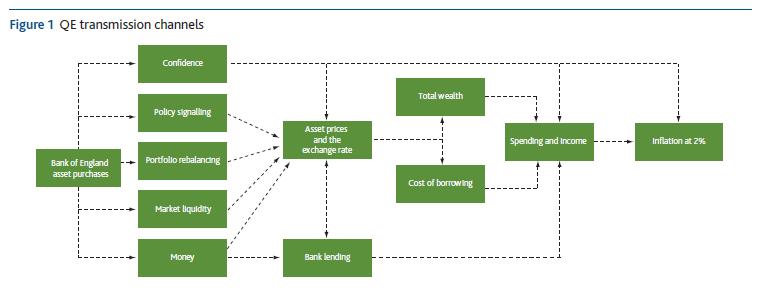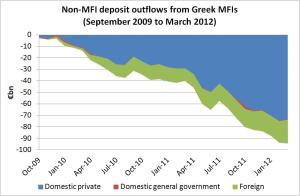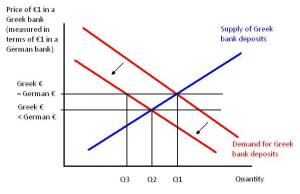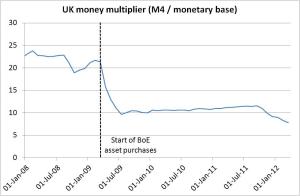A lot of the discussion of the Greek elections has focussed on the strong performance of anti-programme parties such as Syriza (17% on 6 May), Independent Greeks (11%), the Communist Party (8%), Golden Dawn (7%) and Democratic Left (6%) – and their expected further gains (particularly Syriza) on 17 June. This is what’s prompted the fears of an imminent exit. But would an anti-programme government necessarily mean a euro exit?
I can see two parts to this question. Firstly, is there a political incentive for a newly-elected anti-programme government to exit the euro? And secondly, is there an economic transmission mechanism whereby a disorderly sovereign default rapidly forces Greece out of the euro? I’m thinking only about short-term events here – i.e. if a default happens shortly after 17 June, would a Greek euro exit be announced within the next few weeks?
On the political point – anti-programme parties are on the rise, but polls show most Greeks (c.80%!) remain pro-euro. And most votes on 6 May went to pro-euro parties: of the seven parties that made it into parliament, only the two most extreme – the Communists and Golden Dawn – are explicitly anti-euro.
One or more of the anti-programme parties could form a government after 17 June. If they stick to their pledges, this would lead to a drying up of EFSF/IMF loan tranches, an inability to meet Greece’s bond maturities and interest payments as they fall due, and a need to balance the budget overnight to make up for the lack of external funding.
But these parties aren’t yet arguing for Greece to then leave the euro at that point. Indeed, you can imagine that short-term political incentives would make them even less wiling to agree to a euro exit once they’ve formed a government.
The first move in a euro exit would be to freeze bank deposit withdrawals, which would no doubt irk voters; the final move is the actual devaluation, reducing the purchasing power of those very same voters. If you think the Greeks are rioting over austerity, wait to see what they do when their government does these things to them. Meanwhile, all those other anti-programme pro-euro parties outside the government would be going for the jugular, lamenting the prime minister’s awful decision to impose this unnecessary additional hardship on the voters when all they really wanted was someone who could go to Brussels and Frankfurt and negotiate a different deal. There is not, therefore, an obvious political reason why a euro exit would quickly follow on from a sovereign default.
So I therefore wonder: is there an economic reason?
Martin Wolf gave one view in today’s FT:
[…] a cessation of external official funding could trigger a disorderly collapse. The government would default. The European Central Bank would argue that Greek banks no longer possess good collateral, which would prevent it from operating as a lender of last resort. There would be comprehensive bank runs. Athens would impose exchange controls, introduce a new currency, redenominate domestic contracts and default on external contracts denominated in euros.
In Wolf’s scenario, it’s the collapse of the banks that forces Greece to exit. I can certainly envisage such a channel:
- lack of central-bank funds would lead to a system-wide bank run, as depositors try to get their cash out before the banks collapse;
- euros would now be hoarded under mattresses or outside the country, out of fears over bank solvency and redenomination respectively;
- ultimately forcing the government to introduce a new currency just so that ordinary day-to-day transactions can actually take place in Greece.
Yet crucially, I think Wolf is mistaken in suggesting that all central-bank funding would be cut off at the point of a sovereign default. Yes, the Greek banks would no longer be able to use their defaulted Greek government bonds (GGBs) to access ECB facilities; but would they not just turn to Bank of Greece ELA as an alternative? They’ve done this once already, in March/April, when their GGBs briefly became ineligible for ECB operations after the PSI and so they moved them all over to Bank of Greece facilities. And there doesn’t seem to be a constraint on ELA – the Irish did €100bn of it, after all.
Anyway, if the Bank of Greece can continue funding the Greek banks after a sovereign default, I don’t think there’s the same obvious short-term mechanism that will force Greece out of the euro. This isn’t to say that there aren’t other things happening: as I said the other day, central-bank-addicted ‘zombie banks’ don’t default, but they also don’t lend, so the medium-term outlook for Greece would remain fairly grim.
But the point I’m trying to make is that a Greek default soon after 17 June doesn’t necessarily mean a Greek euro exit will immediately follow. Greece could exist in a kind of limbo for while. Indeed – there could be many months between a disorderly sovereign default and an eventual euro exit!
And during that lengthy interlude, could we be hopeful that cooler heads might prevail?










